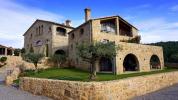H2020 FOWARIM Project: Promoting Research and Innovation in Water and Agriculture in Malta
- Type Project
- Status Filled
- Execution 2016 -2018
- Assigned Budget 960.125,00 €
- Scope Europeo
- Main source of financing Horizon 2020
- Project website Proyecto FOWARIM
The objective of FOWARIM (Fostering Water and Agricultural Research and Innovation in Malta) is to strengthen the research capacity of the Malta College of Arts, Science & Technology (MCAST) Water Research and Training Centre in four crucial topics related to water use in agriculture:
- Reduction in Water Demand.
- Harnessing Alternative Water Sources.
- Renewable Desalination, On-Farm Desalination, and Saline Water Utilization.
- Reducing Negative Environmental Externalities Caused by Nutrient-Rich Agricultural Waters.
This will be achieved by creating an enabling environment for capacity building for Maltese researchers, networking of research institutions, and research policy development. MCAST will receive support to address research gaps and networking gaps from EU partners of recognized scientific excellence in the targeted research topics.
The proposal will be developed over three years and is structured into five work packages, including one for management and coordination, which involves:
- Capacity building through various targeted and advanced training courses, short-term staff exchanges, summer schools, and virtual training.
- Research and knowledge-sharing networks through the provision of technical assistance to establish new demonstration sites to promote innovations and best practices in agricultural water management.
- Help foster new collaborations through co-design of research questions.
- Develop a joint strategy for high-impact research and dissemination; design a research strategy and conduct dissemination and outreach activities. This will strengthen MCAST's research and S&T capacity in water use in agriculture, enhance dynamism among different partners, expand the partnership of research institutions in the relevant sector, contribute to an increase in peer-reviewed publications, and complement Malta's Smart Specialization Strategy in several ways.
A kick-off meeting for the FOWARIM project was held. All partners met in Malta between February 25 and 26, 2016, while the first meeting of the Project Steering Group was held at the IAMB campus (Bari, Italy) on February 27, 2017. To ensure the high quality of the project's outputs, deliverables, and key events, one of the partners (EfB) is monitoring and supervising the quality assurance of the deliverables. An evaluation report was prepared, which included all policies, strategies, and governance related to agricultural water research. The study provided an overview of the situation in Malta that will serve as a reference for the project.
Regarding training, the program for the scientific and management courses was agreed upon, and the first two were organized. These were “Reducing Groundwater Pollution: Good Nutrient and Waste Management Practices,” held at the University of Alicante (Alicante, Spain) from January 9–13, 2017, and “Adapting Agricultural Water Use to a Changing Climate,” delivered by Cranfield University (UK) from March 20–24, 2017. Each course consists of two days of technical training, a field visit, followed by a two-day intensive program on research proposal writing and transferable skills in research article writing and developing personal publication strategies. A methodology, design, and concept for the first Summer School, to be held from September 4 to 7, 2017, in Malta at the MCAST facilities, were developed, while the e-learning methodology, structure, content, program, and schedule were presented to contributing partners for feedback. Following feedback, EfB created an e-learning platform structure and uploaded approximately 80% of the content, which is available within private folders on the Moodle platform.
On April 14, 2016, a meeting with 22 Maltese stakeholders was held at MCAST (Malta) to discuss and identify challenges and potential solutions in water resources management, with a particular focus on the agricultural sector. MCAST and NARC maintain ongoing contact with local research entities, such as the University of Malta and the Maltese Government's Energy and Water Unit, among others, to strengthen local networks and inter-agency cooperation. To further strengthen the relationship between the project and one of its most important stakeholders, farmers, an on-farm demonstration day is planned for June 16, providing an opportunity to focus on R&D innovations in crop monitoring and management, soil moisture sensing, irrigation system management, and water resources (quantity and quality) relevant to Maltese agriculture and the agricultural sector.
This event is aimed at Maltese farmers and will focus on tomatoes, one of the most popular crops in Malta. The project saw the first research efforts related to FOWARIM objectives. Cranfield staff supervised two Master's students who conducted field research in Malta during 2016 in areas related to FOWARIM themes. They received active support from MCAST and FOWARIM staff. A research committee was also established to discuss new knowledge acquired by MCAST and DoA participants through training, the outcomes of workshops with stakeholders, other input from the various FOWARIM tasks, and industry needs to develop research lines in collaboration with other FOWARIM partners. The Terms of Reference for the External Scientific Advisory Board were drafted and published. Two irrigation experts applied for the positions. The Board members are in continuous contact with the research committee, with the former guiding the latter in the research lines being developed and discussed. A project portal was created, along with social media profiles and a project brochure. In addition, a dissemination strategy was developed, establishing guidelines and standards for partner communication to ensure adequate dissemination of the project.
Considering the growing water scarcity in Malta and the crucial role that agriculture can play in improving this situation, FOWARIM (Fostering Water and Agricultural Research and Innovation in Malta) is proposed to enhance and boost the research capacity of the Water Research and Training Centre of the Malta College of Arts, Science and Technology (MCAST).
FOWARIM, a €960,125, three-year project, is 100% funded by the Horizon 2020 Twinning Programme. The main objectives of this project are to strengthen collaboration between partners, train staff to conduct excellent research, develop new lines of research, publish peer-reviewed articles, expand collaboration with research institutions in the relevant sector, and offer solutions to stakeholders who will benefit from this project. This will primarily address four key areas, crucial to the continued existence of Maltese agriculture:
- Reduce Water Demand.
- Make use of alternative water sources.
- Renewable Desalination, Desalination in Agricultural Farms and Utilization of Saline Water.
- Reduce Negative Environmental Externalities Caused by Nutrient-Rich Agricultural Waters.
This will be achieved through the implementation of five work packages that seek to develop research capacity, share knowledge through networks, and build a research strategy for water use in the agricultural sector. The interconnection between partners and the suggested training and networking programs will strengthen MCAST's research and S&T capacity in water use in agriculture, enhance dynamism among different partners, contribute to an increase in peer-reviewed publications, and complement Malta's Smart Specialization Strategy in several ways. The partners in this project are the Malta College for Arts, Science & Technology (MCAST), the Directorate of Agriculture, the Centre International de Hautes Etudes Mediterraneennes (CIHEAM), Europe for Business LTD (EFB), Cranfield University (CU), ID Consulting (IDC), and the Universitat Politécnica de Catalunya (UPC).
The objective of FOWARIM (Fostering Research and Innovation in Agriculture and Water in Malta) is to strengthen the research capacity of the Water Research and Training Centre of the Malta Faculty of Arts, Sciences and Technology (MCAST) in four crucial topics related to the field of water use in agriculture:
- Decrease in water demand.
- Use of alternative water sources.
- Renewable desalination, on-farm desalination, and saline water utilization.
- Reduction of negative environmental externalities caused by nutrient-rich agricultural waters.
This will be achieved by creating an enabling environment for capacity building for Maltese researchers, networking of research institutions, and research policy development. MCAST will receive support to address research gaps and networking gaps from EU partners of established scientific excellence in specific research themes.
The proposal will be developed over three years and is structured into five work packages, including one for management and coordination, which involve:
- Capacity building through various targeted and advanced training courses, short-term staff exchanges, summer schools, and virtual training.
- Creating research and knowledge-sharing networks by providing technical assistance to establish new demonstration sites to promote innovations and best practices in agricultural water management.
- Help foster new collaborations through the joint design of research questions.
- Develop a joint strategy for high-impact research and dissemination; design a research strategy and conduct dissemination and outreach activities. This will strengthen MCAST's research and science and technology capacity in water use in agriculture, enhance dynamism among its various partners, expand the partnership of research institutions in the relevant sector, contribute to an increase in peer-reviewed publications, and complement Malta's Smart Specialization Strategy in several ways.
Overexploitation, indiscriminate use, and climate are key factors in Malta's severe water shortage. Nowhere is this problem more acute than in its main user: the agricultural sector. "Water scarcity must be urgently addressed if agriculture is to survive in the Maltese Islands," says Malcolm Borg, coordinator of the EU-funded FOWARIM project.
However, no research center existed in Malta to investigate and test novel techniques, systems, and technologies to address irrigation water scarcity. "Research on water use in Malta was virtually nonexistent. No institution was conducting water-related research," Borg explains. Recently, the Institute of Applied Sciences at the Malta College of Arts, Sciences and Technology (MCAST) established the Water Research and Training Centre (WRTC) to conduct research in fields related to water management. However, the use of this precious resource in agriculture was not in its plans. The WRTC has great potential to sustain Malta's agricultural sector, but it must invest in research related to irrigation and water use in agriculture. This cannot be achieved without first boosting its scientific and technical capacity, laying the foundation for a culture of water research.
With the support of leading European centers of excellence in water and agriculture, the project team established a research committee in Malta to discuss, analyze, and plan research on water use in agriculture. Comprised of Maltese representatives, the committee discussed local needs and assessed the available physical and human resources to develop potential research avenues. Stakeholders from internationally renowned research institutions, an External Scientific Advisory Board, and local actors also contributed to these avenues. "This knowledge network created the climate, conditions, and framework for sustainable and lasting research in the field of water," says Borg. "The committee will be able to continue to be a benchmark for research potential, providing solutions to the local community." The research and collaborative activities carried out by Maltese researchers resulted in eight scientific articles. "These contain highly significant results for Malta, with broad implications for water governance and management in the agricultural sector," he adds. FOWARIM strengthened MCAST's research capacity through several targeted and advanced training courses for employees, short-term staff exchanges, summer schools, and virtual training. "This capacity building has created a critical mass of local experts that can support the research already initiated," notes Borg. The transfer of knowledge and skills to MCAST will accelerate the adoption of ICTs, contributing to the modernization of training and research in agriculture and water. MCAST has signed two memoranda of understanding with research institutions that will play a key role in maintaining and sustaining research on water use in agriculture, transmitting the results to farmers on the ground. Farmers are already benefiting from FOWARIM.
Field experiments and demonstration sites explained how simple on-site technologies can be used to monitor and manage water more effectively. They were educated about the role and importance of water for agriculture and agronomic aspects, as well as the technical and engineering measures available to reduce water use and increase efficiency. Good practice examples also demonstrate how to reduce crop water demand. "FOWARIM ultimately benefits the farmer," Borg concludes. "We have provided practical solutions to the very real threats they face and to the viability of their agricultural businesses." The accumulated knowledge will also help policymakers better understand the situation and design policies and legislation for better governance and management of this precious resource in Malta.
The project was warmly received by all stakeholders. Government officials, including representatives from the Ministry itself and policymakers in water and agriculture, have shown active interest in the project, requesting regular updates and offering any assistance the Consortium may need.
Very positive feedback has also been received from farmers themselves, who recognized the need for the project and hope it will translate into real-world solutions they can begin to implement. MCAST students and researchers are increasingly choosing degrees for water-related research projects and are encouraged by the momentum the project is generating to find solutions to this real-life problem in Malta. Interest in the training courses has increased, and the applicability of this knowledge to the local context is being valued and recognized.
- MALTA COLLEGE OF ARTS SCIENCE AND TECHNOLOGY (MCAST)







